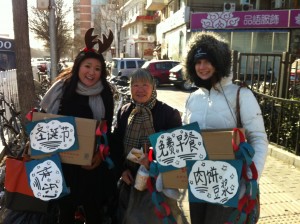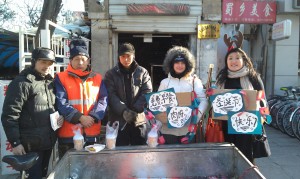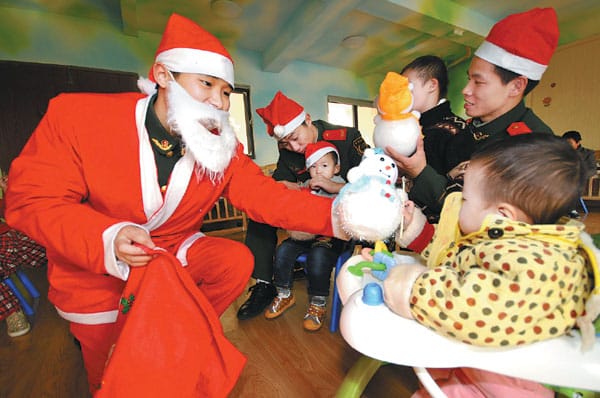 Back in the States around the Holidays there are many opportunities to give – whether it be volunteering at a soup kitchen or giving to Toy-for-Tots, 等等. However, in China I am not familiar with the social giving apparatus. Some church groups organize drives but I am not plugged into that community. So I organized my own “Random Act of Kindness” this year, and in turn, learned important lessons about the different approaches to “kindness” and “giving” in American and Chinese culture.
Back in the States around the Holidays there are many opportunities to give – whether it be volunteering at a soup kitchen or giving to Toy-for-Tots, 等等. However, in China I am not familiar with the social giving apparatus. Some church groups organize drives but I am not plugged into that community. So I organized my own “Random Act of Kindness” this year, and in turn, learned important lessons about the different approaches to “kindness” and “giving” in American and Chinese culture.
On Christmas morning, with the help of two other elves (friends James and Meghan), I spent RMB 100 and bought enough 肉饼s and豆浆s to give 15 people a hot breakfast. We then passed out the gifts to random strangers in Wudaokou, focusing on traffic cops, street cleaners, trash pickers, and other public servants who are out in the freezing cold all day.
Reception of our Beijing 饼 Elves project was mixed. The older 阿姨s and 师傅s were entertained by our weird foreign ways. They endured us in the way you endure cute kids. The younger people however were cool and standoffish, several flatly rejected us saying they weren’t allowed to eat on duty, and then there were others who took the food but refused pictures. Two funny outliers, one wealthy-looking lady parking her BMW while we were trying to give breakfast to the elderly parking guard asked if she could have one too, and a very impoverished garbage picker asked if he could have two. Both we had to decline.
When I originally told people about my idea, I got mixed responses. Foreign friends were encouraging; general consensus was, “Kindness is hard to come by in Beijing.” However, my Chinese friends and family were confused; they cautioned, “Be careful you don’t give people the wrong idea.” This difference prompted me to ponder – are Chinese people unkind? Based on my own experiences, the answer is a resounding “no.” Chinese people are extremely kind, giving, and caring, but what I realized was their preferred avenues of giving are not public like in Western cultures.
I was able to discern two main reasons for this difference. First, Chinese culture does not view gift giving as a one-off, but rather a complex inter-connected web of 关系 where every “gift” comes with strings attached. In Beijing, you will see people giving out small “free” items (tissues, flowers, maps, etc); these things are rarely “free” but rather strategies of street peddlers to solicit money. There is also an issue of human dignity and pride, for charity has two sides: it is an act of kindness to those who are in need, but it is also a product of inequality, implying automatically that the giver is a “Have” while the recipient is a “Have-not.” In China, face (面子) is everything and charity is too one-sided, where only the giver gains but the recipient loses 面子.
Therefore, instead of public displays of kindness, Chinese people care for their families, give to neighbors and colleagues, and volunteer for the local community (小村), because this allows for reciprocal giving on mutually beneficial and socially equal grounds.
The question now is whether or not China, facing a rapidly modernizing society in which traditional bonds of family and community are breaking down, should have more public avenues of charity? As its culture “globalizes,” should its notions of charity and social giving change as well?
如果是在美国,传递圣诞气氛的机会有很多种,可以在餐厅里帮忙,
 圣诞节大清早,在两位精灵(我的朋友詹姆斯和梅根)的帮助下,
圣诞节大清早,在两位精灵(我的朋友詹姆斯和梅根)的帮助下,
我们这些北京的馅饼小精灵在行善时遇到一些混乱的场面。
当我最初把我的这个想法告诉大家时,我得到了不同的回应。
我觉得有两大原因导致了中西文化的不同。首先,在中国文化中,
因此,中国人很少在公共场所行善,他们很多的是关心家人、
现在的问题在于,


